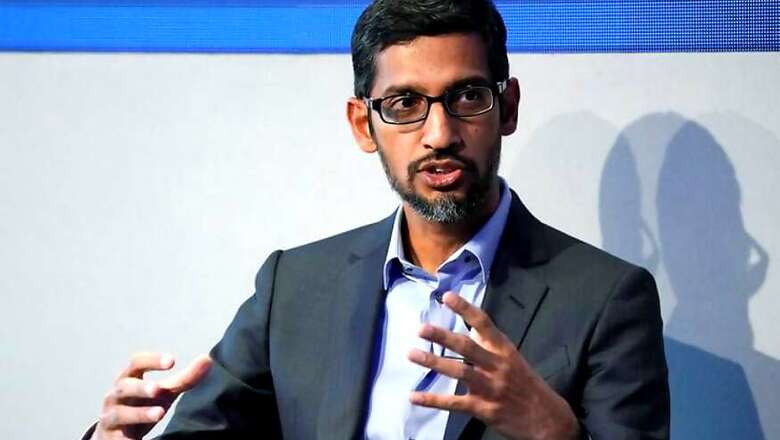
views
Washington: Google chief executive Sundar Pichai parried US lawmakers Tuesday over complaints of political bias and intrusive data collection as the internet giant came under heavy criticism from conservatives.
"We build our products in a neutral way," Pichai said in one exchange with a lawmaker, and added later: "We approach our work without any political bias."
Pichai was called to the House Judiciary Committee following a series of attacks by President Donald Trump and his supporters claiming that Google and other internet platforms were suppressing conservative voices, despite persistent denials from the companies.
The hearing on Google's "data collection, use and filtering practices" offered an opportunity for lawmakers to confront the CEO over claims that the internet giant skews its search results for political reasons.
Google angered lawmakers earlier this year by refusing to send a top executive to a similar hearing with Facebook and Twitter.
The latest hearing comes with Silicon Valley under fire over privacy practices and manipulation, including by foreign governments, and possible monopoly practices.
Committee chairman Bob Goodlatte said it would be "sinister" for Google to manipulate its search engine because of its vast ability to control information people see online.
"The American people deserve to know what kinds of information they are not getting when they are doing a search on the internet," Goodlatte said.
Pichai, dressed in a dark suit, calmly responded to questions, repeating on several occasions that the company seeks to serve a range of viewpoints without bias.
He took on Republican Representative Lamar Smith of Texas, who said it was "irrefutable" that Google's search results were biased.
Pichai replied that "providing users with high-quality and trusted information is sacrosanct to us... we find we have a wide variety of sources including from the left and the right."
He said search algorithms reflect factors such as "relevance, freshness (and) popularity," and added that "we try to reflect what is newsworthy, what is currently being discussed."
- 'Fake news' -
Trump earlier this year took aim at Google, tweeting that search results were "rigged" against him, promoting negative stories from media outlets he considers "fake news."
Some lawmakers raised the prospect of new regulations or modifying the exemption from liability that internet firms enjoy for content from third parties.
Louie Gohmert, a Texas Republican, argued that Google was "surrounded by liberality" and did not recognize its own bias.
But Democrat Jerry Nadler called the bias issue a "fantasy" drummed up by conservatives and said "no evidence supports this right-wing conspiracy theory."
California Democrat Ted Lieu called the hearing "a waste of time" and ridiculed the comments about constitutional rights under the First Amendment.
"The First Amendment limits what the government can do on regulating speech, it does not limit Google," Lieu said.
- What does Google know? -
Pichai also faced comments and questions about Google's data collection and privacy practices, and its discussions on creating a search engine that could be used in China.
Goodlatte said the tech giant was "able to collect an amount of information about its users that would even make the NSA (National Security Agency) blush," arguing that the company needed to be more transparent about what it does with location and other data on Android-powered devices.
Pichai said the data collected would depend on the applications installed and privacy options chosen.
"We remind users to do a privacy checkup and we make it very obvious... they can clearly see what information we have," he said.
He also sought to deflect criticism over "Project Dragonfly," a hotly contested project that could offer a search engine that would satisfy Chinese censors.
"Right now we have no plans to launch in China," he said.












Comments
0 comment